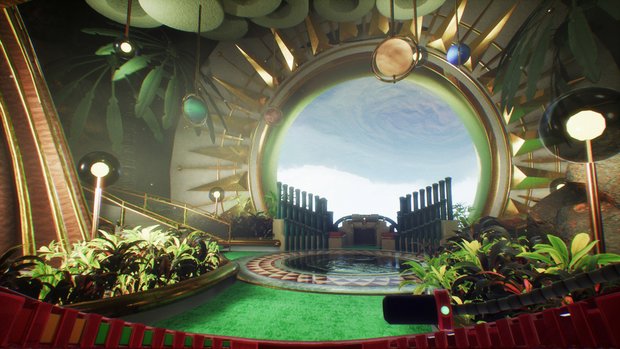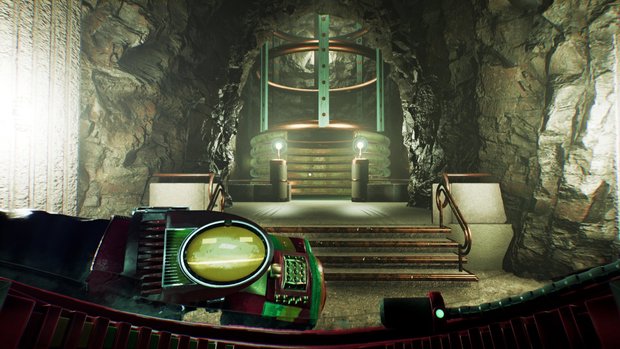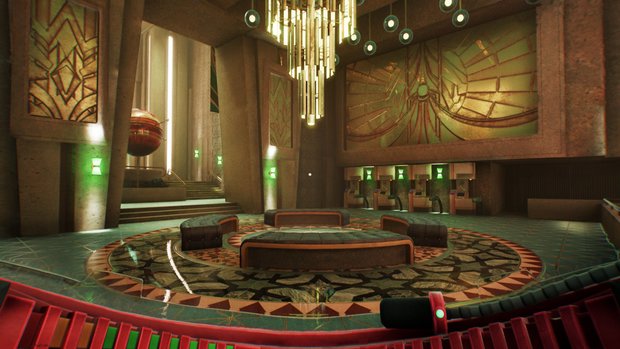Return to Grace review

- 0 Comments
Beautiful sci-fi exploration of AI bestows a short but favourable time on all who come to play
Artificial Intelligence. It’s been all over the news and is poised to be the next big technical revolution. So it couldn’t be timelier for Creative Bytes Studios’ first-person 3D adventure Return to Grace to weigh in on the role of AI in society. While its approach may lean more into space opera than a serious sociological study, the game flirts with ideas that raise interesting notions about the future of this transformative technology. In the 39th century, exploration of a beautiful abandoned base on the third moon of Jupiter with a fascinating band of AI agents is the order of the day. Gameplay is simple and the puzzles can be repetitive, but communicating with the distinctive artificial personalities is interesting and entertaining as the protagonist wanders through the impressive environments contained within the installation.
Players control historian Adamari “Adie” Ito as she seeks to uncover whatever happened to Grace, the titular AI, designed to monitor all of the macro- and micro-level situations facing humanity. Adie is accompanied by her own AI, Allen, a mellow-voiced personality that speaks to her from a wrist-mounted device that serves as a communicator, GPS tracker, media player, and hacking tool. After the two have a less-than-smooth landing on the frigid surface of Ganymede, Adie must find her way to the Grace Spire.
After installation, Grace was integrated at all levels across the solar system, and everything seemed to be going well at first, whether dealing with the efficient running of society’s institutions or overseeing the fulfillment of the needs and wants of individuals. Then Grace’s guidance inexplicably disappeared, plunging humankind into a new dark age. Nine hundred years later, Adie infiltrates the base to piece together what led to Grace’s withdrawal as a controlling presence, and what has happened to her since. Parts of the tale are provided through recordings left by the previous inhabitants of the Spire, as well as through conversations with the fractured remains of Grace herself.

Understandably, an AI designed to oversee every facet of society – to the point of being deified and asked to grant wishes – requires a great deal of power to operate. The base is now in a poor state, however, and the full computing power of Grace is unavailable when Adie arrives. As she progresses, she encounters different fractured remains of Grace. Similar to Allen, these AIs of Logic, Control, Empathy, Pal, Mom, and Jack, are able to speak to Adie through her wrist device. Each represents a different aspect of Grace: Logic is no-nonsense, all about taking a studied and reasoned approach; Mom insists Adie take the safe path; while Pal is a vicarious adventure seeker, always wanting Adie to do dangerous things. Control is the sinister one who demands Adie do what he says to restore him as the god of humanity.
Throughout the adventure, Adie has a steady stream of conversations with the different Grace aspects she acquires. Some of these are fun and charming, like her dealings with Pal when he needs to operate a rocket pack for her so she can swoop in close to a frozen tram rail with a blowtorch to melt the ice. Others provide opportunities for character development, such as the discussions between Mom and Adie exploring the deeper reasons behind Adie coming to Grace Spire. Some question the role of AI in society. Control clearly feels that he should be in charge of everything and making all decisions for humanity. Meanwhile, Jack(-of-all-Trades) just wants to be helpful and grows puzzled if Adie refuses his aid.
There are kernels of interesting sociological issues here with respect to artificial intelligence – how it should be treated, what level of impact it should have, and in which facets of the world AI should be integrated. However, these notions aren’t explored in any deep way, which seems a bit of a missed opportunity. That said, the conversations Adie has with the AI characters at predetermined points are a lot of fun. Each personality is nicely delineated and they are definitely the highlight of the whole experience.
Adie and each of the AIs are fully voiced. The performances are all very well done and the voices complement the personalities of the virtual characters. Despite representing digital creations, each AI voice is warmly human with no mechanical or computerized effects overlaid. The rest of the audio largely consists of ambient noises, such as the sound of the raging snowstorm outside the base or the beeps of the buttons Adie toggles on control panels. Occasionally, short riffs of instrumental music come in to punctuate the more dramatic moments of the storytelling.

Return to Grace poses a variety of challenges, many of which can be solved in multiple ways. Some are as simple as choosing to take a more direct path – often also more dangerous – or a more circuitous but safer route. Others are more puzzle-y, such as hacking digital message canisters, which is done with Adie’s wrist device. Here Adie raises her wrist so that its oval control surface can be seen first-hand. A dot in the center can be moved all around it, while a meter on the edge of the display shows how close the dot is to a target location that needs to be found to complete the hack. Think a digital version of playing hot and cold.
Other challenges include repeating Simon-esque sequences of computer equipment button presses, or bypassing different locked doors by tapping light-up buttons to form a given figure like an X or four corners. None of these are difficult, but they do get repeated frequently. For those who grow tired of solving the same types of tasks, once the Jack personality becomes available, he offers to solve the puzzles for Adie. All of these interactions, and the controls needed to trigger them, are listed on-screen along with the names of the objects that can be operated on when Adie draws close enough to them.
If you’re concerned about the more physical challenges Adie may face, you need not worry. While the AIs speak of certain paths being more dangerous, it’s not possible to die. Failing a physical task either results in being able to attempt it again, the task being simplified, or an alternate route being taken. Take, for example, the first time Adie encounters a highly placed beam she can cross. Crossing the beam is as simple as moving forward, but at a pre-scripted point Adie will begin to wobble. By using the left or right movement controls, you can help her regain her balance. Failing to do so will cause her to drop to the ground below, but from there she can climb a trellis to reach the beam and try again. If you keep having trouble, after a couple more failed attempts, the point where Adie begins wavering is removed and she can just walk across without incident. Sometimes these balancing acts can be avoided altogether by seeking out alternate paths available.
With all the Grace aspects chiming in with their own points of view to influence Adie, there are also ample player choices available that align Adie a bit more closely with one or more of the AIs, while alienating others. The sum of these choices is reflected back later in the game, when Adie draws near to finding out the ultimate fate of Grace. This gives rise to a variety of endings. The game can be completed in under three hours, meaning it’s not a burden to replay to try different options. Helping with this is a save system that can be gamed to reduce the need to start over from the beginning. When commencing a new game, four save slots are made available. As progress is made, an autosave kicks in at each new area, saving over the chosen slot. However, from the save slot selection screen, it’s possible to copy an existing game into another free slot. While more cumbersome than a proper manual save system, it does allow for different checkpoints to be permanently recorded so parts of the game can be more easily revisited.
Despite being set in a space base of sorts, the Grace Spire looks more like a health spa retreat. To be certain, there are some industrial areas, such as the series of access tunnels Adie has to navigate to enter the base or the reactor room that she has to get operational. However, most locations are much more elegant. You’ll encounter a lush vegetation Zen garden, a series of almost hotel-like rooms where people would stay during their pilgrimages, and a massive meeting hall that feels like a cathedral or church to preside over the masses, among other settings. Well-realized and visually detailed, these sites can be very impressive to behold.
Final Verdict
Return to Grace is an entertaining exploration of an inviting futuristic space habitat. The various AIs who chat with Adie and each other turn what would otherwise be a simple roam through empty rooms and corridors into a delightful journey with mostly pleasant company (Control’s demands for dominance over humanity aside). The sights and sounds are quite evocative, and the low-difficulty puzzles – which can even be bypassed entirely with the help of Jack – ensure that proceedings keep moving briskly. Sometimes poignant, sometimes funny, sometimes thought-provoking but always fun, Return to Grace doesn’t provide much challenge or delve into its themes very deeply, but it’s a fine way to explore some of the questions around artificial intelligence through the lens of science fiction rather than the reality of contemporary society.
Hot take
While not as deep as it could be, Return to Grace’s discussion of the role of AI in people’s lives – with those very AIs themselves – is a pleasant accompaniment to the wonderful sites discovered aboard an abandoned space base of the future.
Pros
- Companion AIs are fun and engaging
- Voices are spot-on for their characters
- Investigation into the central mystery proceeds at a perfect pace
- Locations are impressive to behold
Cons
- Could have explored more real-world concerns with advancing AI
- Puzzles can be repetitive
- Save system is cumbersome
Richard played Return to Grace on PC using a review code provided by the game's publisher.










0 Comments
Want to join the discussion? Leave a comment as guest, sign in or register in our forums.
Leave a comment